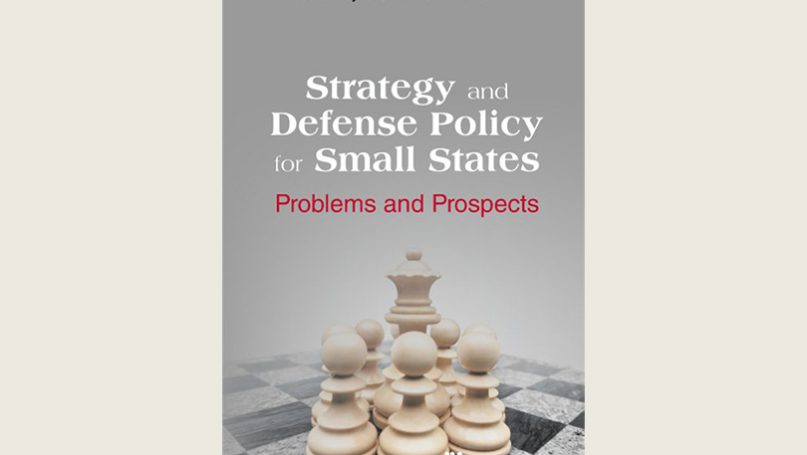
Strategy and Defense Policy for Small States: Problems and Prospects
Edited by Bernard F W Loo
World Scientific Publishing, 2022
I am penning this review over six months after Russia invaded Ukraine. Recently, Russian President Vladimir Putin announced a partial mobilisation of troops to support the ‘military operation’ in Ukraine. Lithuania (population: 2.8 million) immediately raised the level of readiness of its army’s rapid response unit, so as to “prevent any provocations from the Russian side”, as defence minister Arvydas Anusauskas explained. Lithuania is a small state, a member of NATO since 2004, and shares a 200 km border with Russia’s Kaliningrad oblast.
With the Russian invasion of Ukraine, and an increasingly tense situation in the Taiwan Strait, 2022 is indeed a very apt year to deliberate soberly over the thematic of this new book. What are the challenges facing small states when all attempts at deterrence – the small states’ best form of defence – fail and war breaks out in their neighbourhood? How does one strategically prepare to face situations that involve fully-fledged and highly technological (and expensive) warfare, possibly instigated by large and well equipped powers? While strategic considerations remain a paramount logic, their “grammar” (p.xxiv) – that is, how strategy actually translates into a pragmatic undertaking – ought to reflect the specific conditions of practitioners, including presumably their status as small states.
The editor addresses these issues in this book and its set of seven chapters, co-authored by himself as well as three additional colleagues, all of whom (except one) hail from the S. Rajaratnam School of International Studies (RSIS), Nanyang Technological University (NTU) of Singapore. The volume is part of a series of events that celebrate the 25th anniversary of the Institute of Defence and Strategic Studies (IDSS), now part of RSIS. Editor Loo is the Coordinator of the Strategic Studies Programme offered by RSIS; and this book can be seen as a monograph that would lend itself as required reading for the local and international students following this programme.
Three sets of concerns girdle this publication. The first asks whether much of what is understood as ‘strategic studies’ is actually Western in origins, assumptions and focus and therefore possibly ripe for some serious revisionism to be more useful to Singapore, South-East Asia and the Global South generally. The second is to delve more deeply into ‘conventional’ military strategy, shorn of the use (or threat of use) of nuclear weapons and which would be more suitable to and for small states: after all, only one ‘small state’ – Israel – is currently presumed to have nuclear capability. The third is to acknowledge that military operations do not only cover war: they include humanitarian efforts, peace operations and disaster response initiatives. These are the three thematics that are competently covered in this book.
Of course, the book’s publication predates the 2022 chapter of the Russia-Ukraine conflict. We have, in the course of the last six months, witnessed the vulnerability of tanks, the deployment of new and smart weaponry (from drones to HIMARS), but also the continued relevance of material, natural obstacles – rivers in particular – for defence purposes. We have also witnessed a huge humanitarian crisis, with millions of people seeking refuge out of Ukraine, and remaining unsure as to whether their migrations are temporary, permanent or cyclical. These issues are grappled with in this timely book.
The book oozes ‘Singapore’ in all its pages. It is also meant to affirm the academic credentials of the staff at RSIS and their ability to critically ‘understand’ and conceptualise the challenges facing small states as they – like Lithuania this week – recalibrate their strategy and defence policy in light of what is going on around them. What is disappointing here is that there is hardly any attempt to theorise ‘the small state’. To use the editor’s own words, the small state ‘grammar’ is missing. Indeed, in a context where there is an escalation of conflict and battle-readiness, there is also room to put forward the merits of peace and to propose an end to hostilities. Small states thrive best in an international order where peace prevails; indeed, most do not even have ‘armies’ and are not equipped with the latest weapons systems.
Small states have historically also done well in terms of brokering the cessation of conflict and hostilities, and arranging prisoner swaps between warring parties. While the authors acknowledge the general relevance of geopolitics and geostrategy (especially in Chapter 1) to the subject matter, they do not engage with how these considerations are especially pertinent to small states and territories, most of which are single islands or archipelagos. One wonders whether places like Taiwan or Cuba would be the ‘refuges’ that they are today if they were not island units. This lapsus is surprising, seeing that Singapore itself is an island jurisdiction.
In any case, I certainly recommend this book for those interested in studying military strategy and defence policy from a non-Western and non-nuclear perspective, while also tackling non-military interventions which, alas, usually accompany warfare.